Ever thought of tending your garden like a wise old farmer from tales of yore? Well, you’ve gotta start with the best organic fertilizers to make your soil thrive. Grab some compost, aged for at least 6 months, and mix 2-3 inches into your beds each spring. Then, there’s manure, bone meal, and more waiting to boost your blooms. Stick around to uncover which ones suit your patch best!
Contents
- 1 Compost Benefits Garden Soil
- 2 Manure Enriches Soil Naturally
- 3 Bone Meal Boosts Growth
- 4 Seaweed Enhances Soil Fertility
- 5 Fish Emulsion Nourishes Plants
- 6 Worm Castings Improve Soil
- 7 Alfalfa Meal Strengthens Plants
- 8 Cottonseed Meal Fertilizes Organically
- 9 Kelp Meal Supports Growth
- 10 Bat Guano Fertilizes Effectively
Compost Benefits Garden Soil
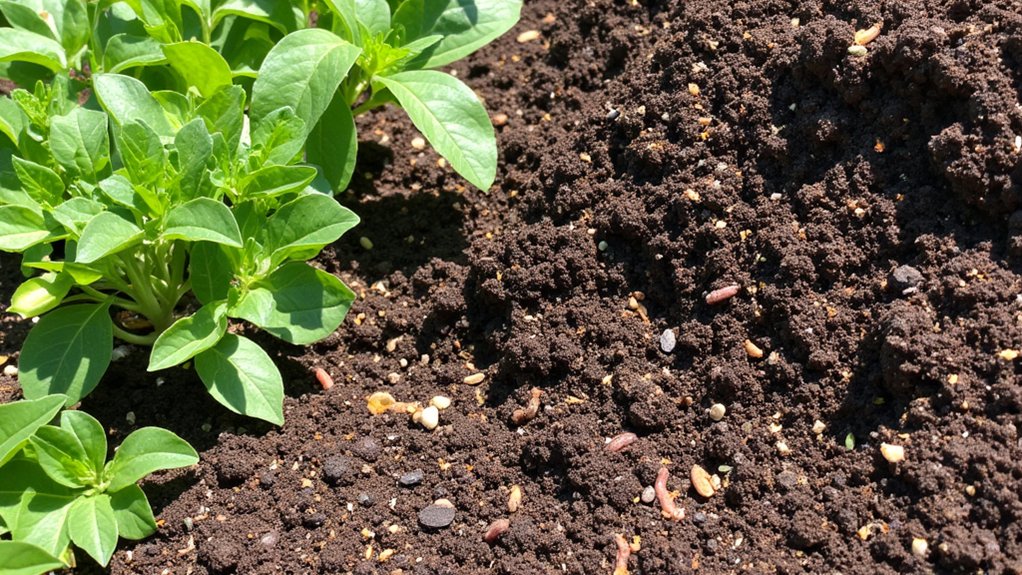
Hey, let’s plunge into how compost can transform your garden soil into a powerhouse of nutrients. You’ve got kitchen scraps, yard waste, and more just waiting to help. Start by collecting vegetable peels, coffee grounds, and grass clippings in a bin.
Mix these materials in a pile, aiming for a 3:1 ratio of browns—like dry leaves—to greens, such as veggie scraps. Turn the pile every two weeks with a pitchfork to speed decomposition. In about 6-8 weeks, you’ll see dark, crumbly compost ready to use.
Spread a 2-3 inch layer over your garden beds, then mix it into the top 6 inches of soil. Watch your plants thrive with this nutrient-packed boost. It’s simple, effective, and totally worth it!
Manure Enriches Soil Naturally
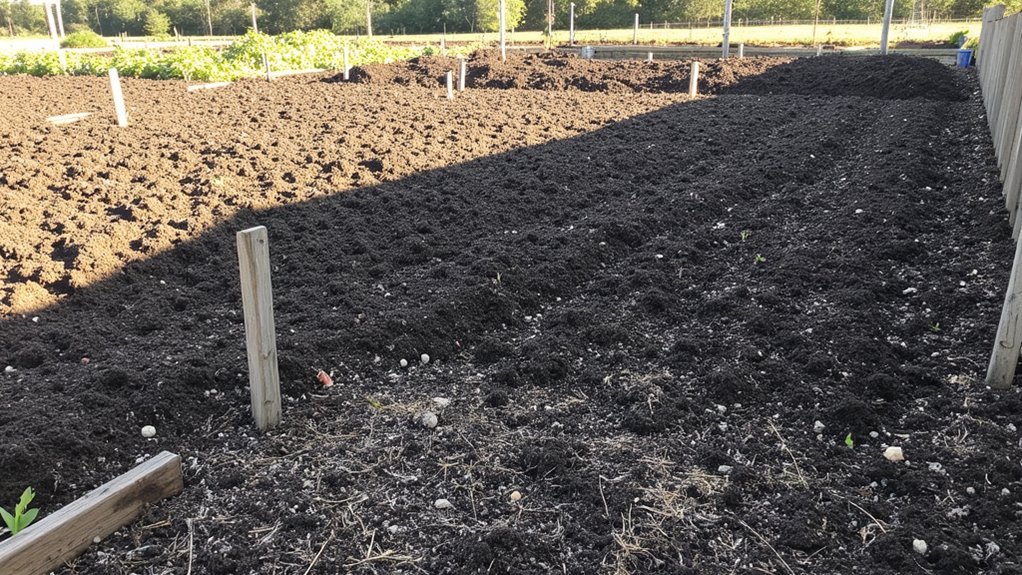
Folks, let’s plunge into using manure to naturally enrich your garden soil. It’s a powerhouse of nutrients, and you can’t beat its natural benefits. Manure from cows, horses, or chickens adds nitrogen, phosphorus, and potassium, essential for robust plants. Spread it right, and you’ll see results fast.
Start by sourcing well-aged manure—fresh stuff can burn roots, so let it compost for 6-12 months. Apply about 2-3 inches over your garden bed, then work it into the top 6 inches of soil. Do this in fall or early spring, giving it time to break down before planting.
Be cautious, though—too much can lead to nutrient overload, so stick to 40 pounds per 100 square feet. Watch your garden thrive with this simple trick!
Bone Meal Boosts Growth
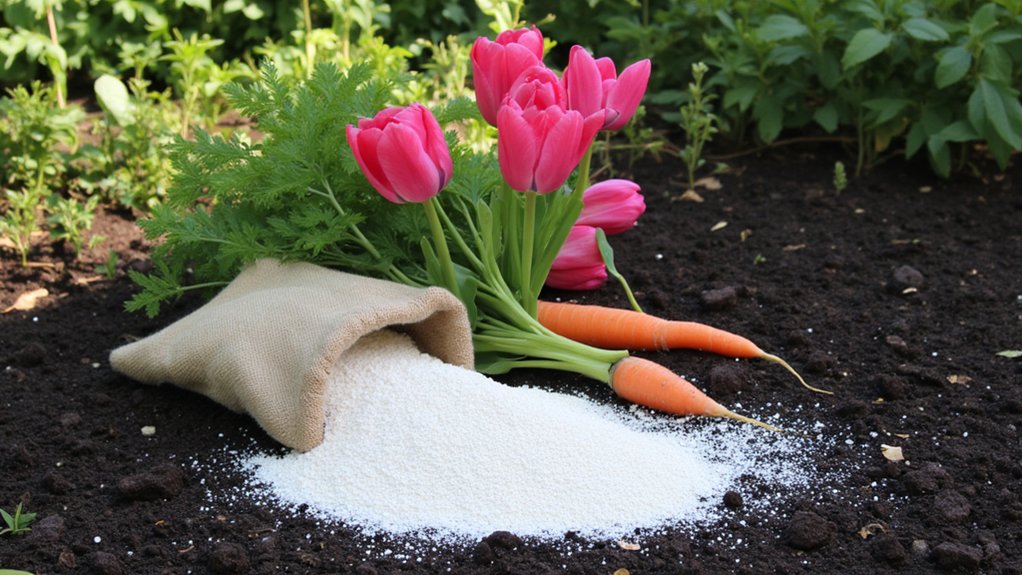
Gardeners, let’s talk about bone meal, a fantastic organic booster for your plants. It’s packed with phosphorus, usually around 15%, and calcium, which roots crave. You’ll see stronger growth, especially in flowering plants and veggies.
Wondering how to use it? Mix about 1 pound of bone meal into every 100 square feet of soil before planting. Dig it in 2-3 inches deep, ensuring it blends well. This slow-release fertilizer feeds plants for months.
Apply it in early spring or fall for best results. Focus on areas with bulbs, like tulips, or root crops, such as carrots. Don’t overdo it, though; too much phosphorus can harm balance. Check your soil’s needs first, and you’re set for a thriving garden!
Seaweed Enhances Soil Fertility
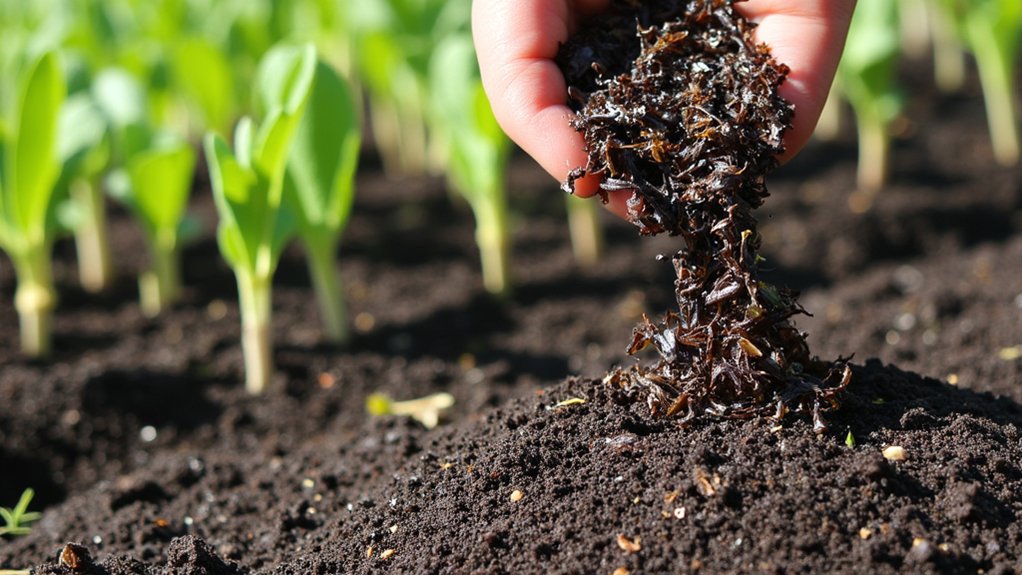
While you’re exploring organic options, let’s plunge into seaweed as a powerhouse for soil fertility. It’s packed with trace minerals, like potassium and magnesium, that your garden craves. You’ll find it boosts soil structure, too, helping roots grow deep.
Now, grab some dried seaweed or liquid concentrate from a local store. Mix about 2 tablespoons of liquid seaweed with a gallon of water, or sprinkle 1 cup of dried flakes per 100 square feet of soil. Apply this every 2-3 weeks during the growing season for best results. It’s that simple, and your plants will thank you with stronger growth.
Don’t overdo it, though; stick to the recommended amounts. Too much can mess with soil balance, and you don’t want that hassle.
Fish Emulsion Nourishes Plants
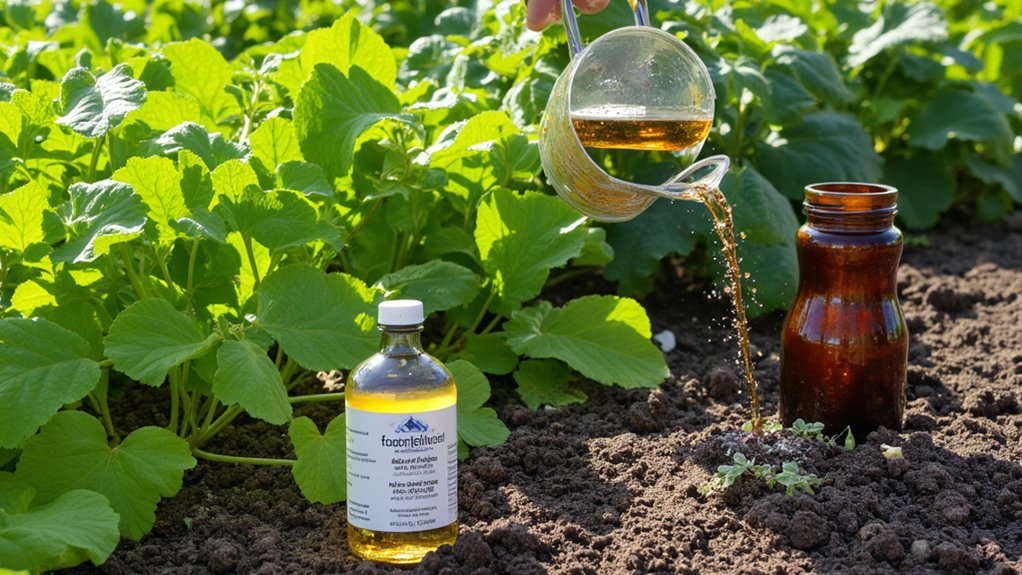
As we plunge into another organic gem, let’s talk about fish emulsion, a fantastic nutrient boost for your plants. It’s a liquid fertilizer made from fish byproducts, packed with nitrogen, phosphorus, and trace minerals. You’ll love how it feeds your garden naturally.
Start by diluting it—mix 1 tablespoon per gallon of water, ensuring it’s not too strong. Apply this mix every two weeks during the growing season, directly to the soil around your plants. It absorbs fast, so you’ll see greener leaves in days.
Be cautious, though; it’s got a strong fishy smell, so use it outdoors. Store it in a cool, shaded spot to keep it effective. With fish emulsion, you’re giving your plants a nutrient-packed meal!
Worm Castings Improve Soil
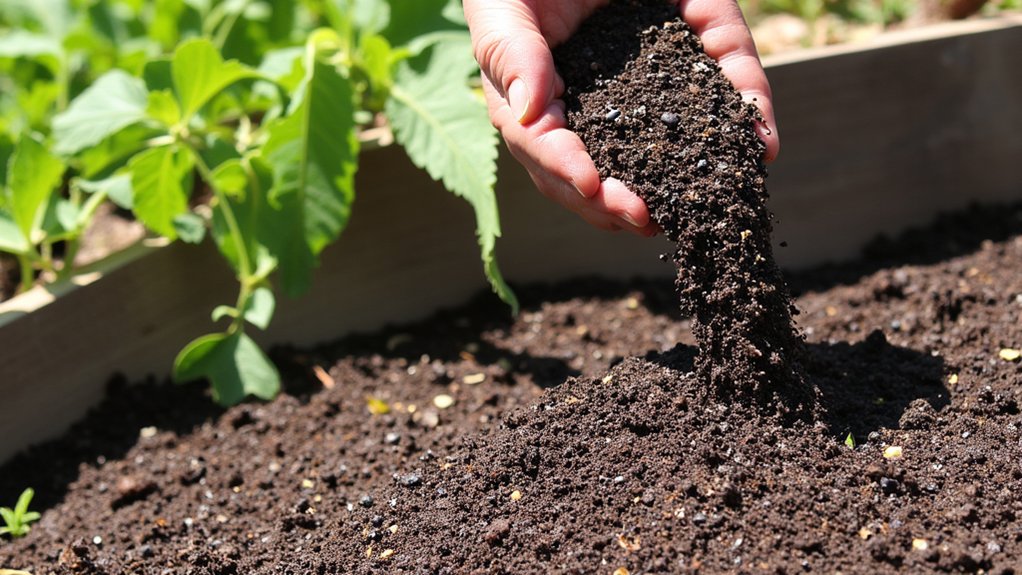
Hey there, let’s immerse ourselves in the magic of worm castings, a powerhouse for improving your garden soil. You’ve got a natural treasure here, packed with nutrients and beneficial microbes. Worm castings, often called “black gold,” enhance soil structure and water retention like nothing else.
Start by mixing about 1 cup of castings per square foot into your garden beds. Do this every 2-3 months, ideally before planting or during early growth stages. It’s simple—just spread them evenly, then work them into the top 2-3 inches of soil.
You’ll notice better root development and healthier plants over time. Castings also improve aeration, so your soil stays loose. Keep a small stash handy, and apply as needed for consistent results.
Alfalfa Meal Strengthens Plants
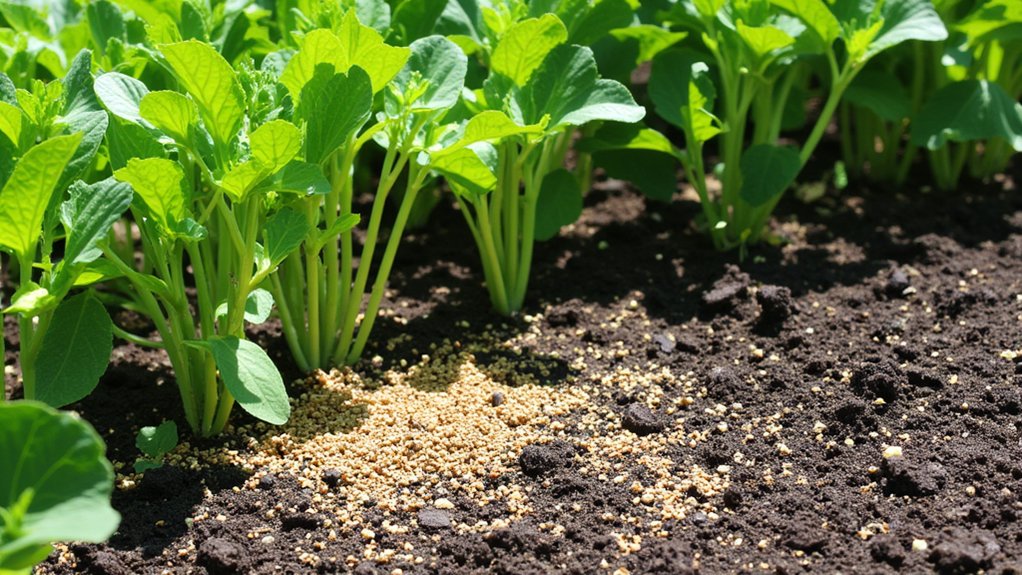
Curiosity might nudge you to explore alfalfa meal, a fantastic organic booster for your garden plants. It’s packed with nitrogen, potassium, and trace minerals, so it’ll strengthen roots and boost growth. You can’t go wrong with this natural option!
Start by mixing 2-3 pounds of alfalfa meal into every 100 square feet of soil. Do this before planting, or sprinkle it around existing plants, then water thoroughly. It breaks down over 2-3 weeks, releasing nutrients steadily.
Don’t overdo it, though; too much nitrogen can burn delicate plants. Stick to applying it every 6-8 weeks during the growing season for best results. You’ll see healthier, sturdier plants with vibrant leaves. Give it a try, and watch your garden thrive!
Cottonseed Meal Fertilizes Organically
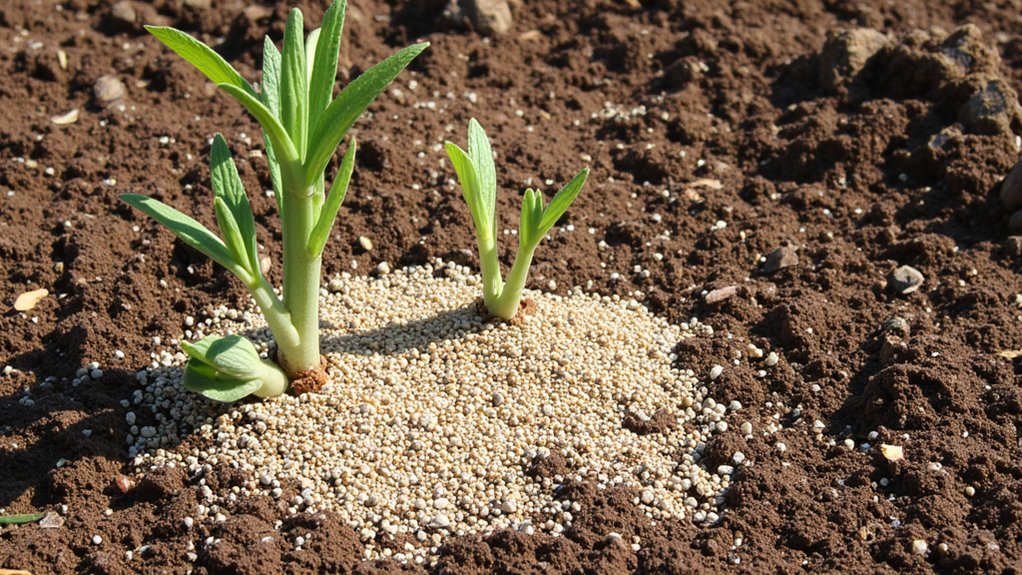
While you’re exploring organic options, let’s investigate cottonseed meal, a solid choice for enriching your garden soil. It’s packed with nitrogen, usually around 6-2-1 on the NPK scale, so it boosts leafy growth. You’ll find it works best for veggies like lettuce or spinach.
Mix about 5 pounds per 100 square feet into your soil before planting. Do this in early spring, and water it in well to help it break down. It releases nutrients slowly over 4-6 weeks, so don’t expect instant results.
Check the label, though, as some cottonseed meal might have pesticide residues. Opt for organic-certified brands to keep your garden truly natural. Stick with this, and you’re set for healthier plants.
Kelp Meal Supports Growth
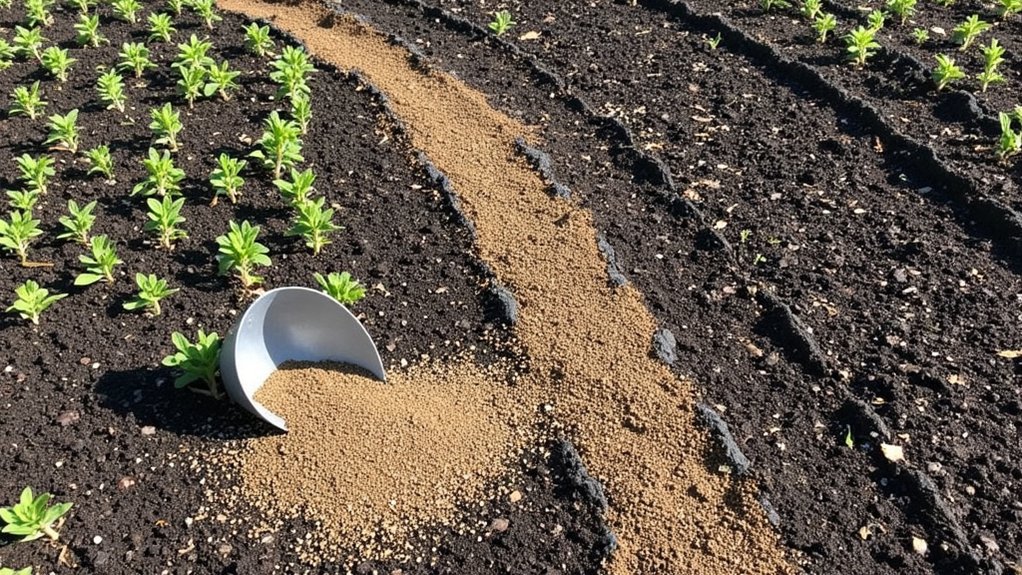
Let’s move on to another fantastic organic option, kelp meal, which can seriously boost your garden’s growth. You’ll find this seaweed-based fertilizer packed with nutrients like potassium and trace minerals. It’s great for improving soil health, and it helps plants resist stress.
Here’s how you use it: mix about 1-2 pounds of kelp meal per 100 square feet into your soil. Do this in early spring, before planting, to give roots a strong start. Water well after applying, ensuring it blends into the earth.
Why’s it so effective? Kelp meal releases nutrients slowly over weeks, feeding plants consistently. You can also sprinkle a light layer, about a quarter-inch, around established plants mid-season. Watch your garden thrive with this natural boost!
Bat Guano Fertilizes Effectively
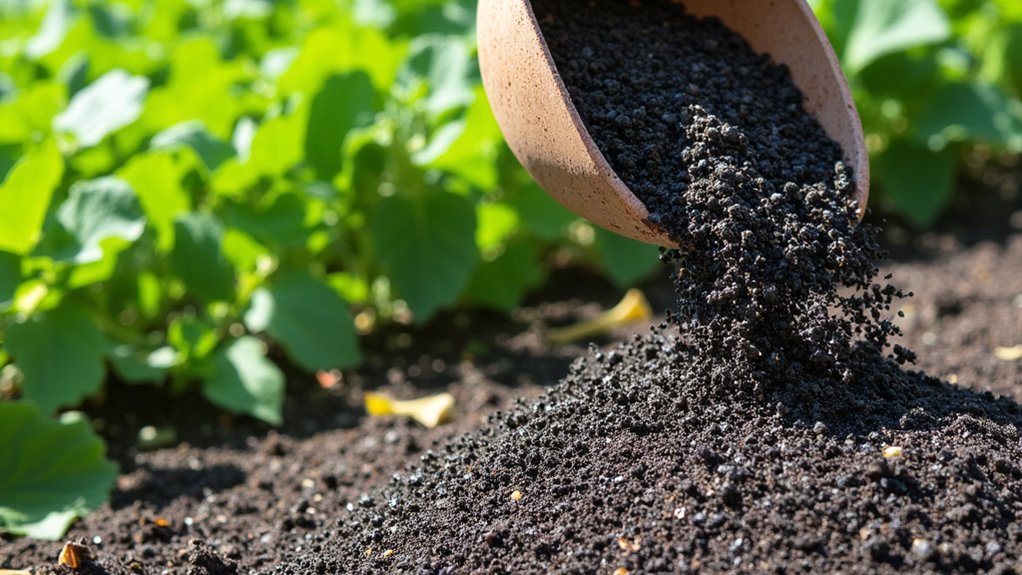
As you explore organic fertilizers, consider bat guano, a powerhouse for your garden’s nutrition. It’s packed with nitrogen, phosphorus, and potassium, often in a 10-3-1 ratio, perfect for boosting growth. You’ll find it’s a fast-acting option, too.
Here’s how you use it: mix about 1-2 tablespoons of bat guano per gallon of soil before planting. Apply it every 4-6 weeks during the growing season, working it gently into the topsoil. Don’t overdo it, though; too much can burn your plants.
You can also brew it into a tea for liquid feeding. Steep 2 tablespoons in a gallon of water for 24 hours, then water your plants. See the difference in lush, green growth—nature’s little secret at work!
